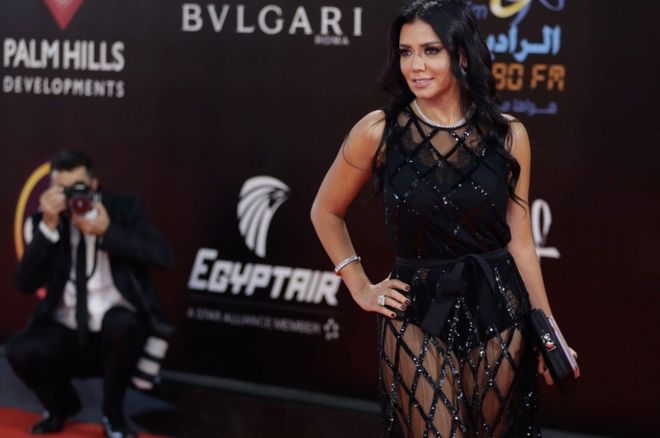Fashion Scandal Reveals Egypt’s Islamification
January 4, 2019
Egyptian actress Rania Youssef no longer faces charges for her politically-charged fashion scandal, but the tides stirred by her revealing dress indicate the grand scope of social change in Egypt.
November 29th marked the closing ceremony of this year’s Cairo International Film Festival. Amidst the sea of grandiose fabrics and glittering lights– a classic of red carpet ambiance– Rania Youssef provided a stark contrast. Donning a sheer black sequined gown, the star showcased her legs in a way familiar to the Western world. Such wardrobe, however, is not a feature of Egyptian society and has cast scandal on a star-studded evening. The festival was punctuated for Ms. Youssef by four hours of questioning, followed by charges of public obscenity and incitement to debauchery. Threatened with five years in prison, her fate was strung by the black netting of that now-infamous dress.
Perhaps most shocking is which factions of Egyptian society have reacted uproariously. In a nation under the Ministry of Culture’s censorship, it makes sense that event officials would be outraged by a racy fashion choice. Less expected is the outrage seething up from the general population. A current Islamic revival in Egypt is sweeping the once progressive Cairo into a state which seemed altogether abandoned some decades ago. Many trace the revival to the 1967 Six-Day War, during which Israel’s defeat of the Arabs led Egyptians to blame the trend of Westernization for compromising traditional Islamic values. Subsequent decades brought nationalism, Pan-Arabism, socialism, and capitalism, none of which have provided any relief to a nation under tumultuous economy and leadership.
Nowadays, enforcement of strict Islamic codes bubbles up from the pressures of the people. Movie theaters turn cacophonous as patrons storm out of films they deem inappropriate for alcohol use, dress code, or shows of affection. Women who used to dress freely are shamed in the streets, and many are beginning to take up the veil that their predecessors fought for so long to abandon. A growing trend has been for female singers and actresses to retire from their careers and veil themselves, embodying their faith in the Islamification. Husbands and brothers are encouraging a return to restrictions on their female relatives, and celebrity advocates reinforce the belief that these restrictions are not oppressive but just in the eyes of religion. While Islam and wearing the veil are perfectly respectable cultural facets, it remains important to ensure that free will is the driving force behind societal changes, especially in a nation that has proved susceptible to political corruption. As Nagwa Shoeb, director of public relations at the liberal American University in Cairo told the Chicago Tribune, “I always say if they’re covering their hair, it’s OK as long as they are not covering their minds.”
In a nation that has pitted all of its corruption and humiliation on the West, organizations like the Muslim Brotherhood– a prominent engine in the conservative wave– cite a return to Islam as a return to family values. The ultimate goal is to transform the secular government back to Shariah and create Egypt as a true Islamic homeland.
The personal risk Youssef was subjected to last month was beyond the Western imagination. Sherine Abdel-Wahab, an Egyptian pop artist, was sentenced to six months in prison for joking onstage about dirty Nile River water. While she was later acquitted, many other instances show celebrities imprisoned in order to set an example. Currently, female human rights activist and sexual harassment survivor Amal Fathy is imprisoned for decrying sexual harassment in a Facebook video, as Amnesty International works tirelessly to overturn her two-year sentence.
Rania Youssef’s fate may be thankfully saved, but this hit to her reputation has left her apologetic and still steeped in scandal. The implications of the response to her black dress radiate far beyond Cairo’s red carpet.
